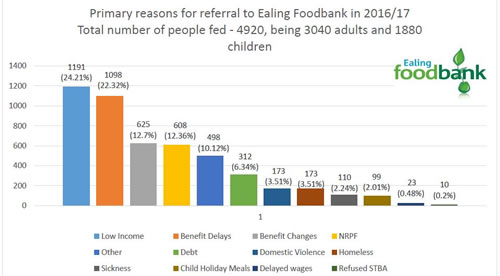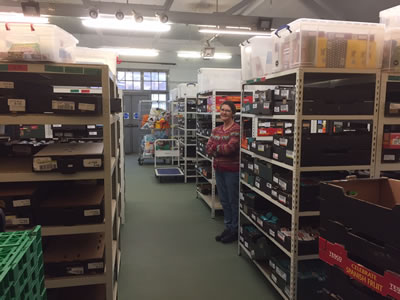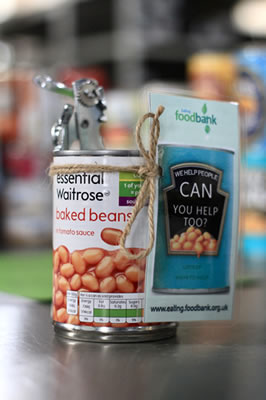New figures show those with low income are relying on the service

| Tweets by @actonw3com |
Latest figures show an increasing number of people are being referred to the borough's Food bank because they aren't earning enough and charity administrators say the situation is getting worse.
Rory Thomas finds out more about a vital service helping feed thousands:
Ealing Foodbank (EFB) currently operates six cafes in the borough. These sites are in Acton, Hanwell, Northolt, Southall, and two sites in Greenford (one on a Saturday and one on Monday). All centres in Ealing are borrowed venues hosted by local churches
Earlier this year, EFB secured new premises at St Mellitus Hall, Hanwell. The move was largely due to a ‘significant anonymous donation’ two years prior. Previously, the charity had occupied temporary offices on Uxbridge Road, West Ealing, with various storage facilities scattered across the borough. The funds had been reserved for just such an opportunity, and negotiating a new space adjacent to St Mellitus Church means the food bank has now consolidated its storage capacity, and alleviated many logistical pressures. Charity Administrator, Janet Fletcher, said: “I worship here and I noticed this was an underused resource to the church. We are really grateful for this place and thanks to the donation we can afford the rent.”

Ealing Foodbank is a Christian led organisation and registered charity that launched in October 2013. The charity is part of the Trussell Trust network of food banks (currently with 420 sites across the UK) and each site is run in largely the same way: to provide food and advice to those in crisis. Although this is a Christian led initiative, they are non-proselytising and have a wide demographic of volunteers.
Other services clients receive might include programmes to improve language and social skills, support with self-esteem, or writing a CV. According to Janet, Help Through Crisis, a Big Lottery Fund initiative seeks to ‘assist clients out of their crisis’ delivering a ten-week programme, much like a mentorship. The first three-to-four-weeks focus on resolving the crisis - such as an imminent eviction for example - by providing legal advice or help with benefits. Then, offering and on-going programme of care so clients are ‘more resilient should a similar “crisis” arise in the future’. Eat Well, Spend Less (another Trussell Trust Initiative), educates people on how to buy fresh healthy produce, be more mindful of nutrition value, and advice on preparing decent meals and saving money.
“We are also excited to be working with other people. New partners, the Felix Project, Park Royal, take food about to be discarded by shops, and on Wednesday’s we get a delivery of fresh bread, three trays of bread, which we deliver to Hanwell, Southall and Acton.”
Despite the recent successes and developments, the need for food bank cafes in Ealing is growing. According to their annual reports collated by the Trussell Trust, EFB had served 4,100 individuals at the end of the financial year 2015/16. By 2016/17 that number had leapt to 4,920 (3040 adults and 1880 children), just in the borough of Ealing.
Almost one quarter (24.21% or 1191 individuals) were those on ‘low income’ making up the largest portion of people in need of food bank services. Next, those who have been ‘delayed benefits’ (22.32% or 1098 individuals). The Conservative government euphemistically referred to this group as “JAMs” (Just About Managing). “I don’t like that term”, said Janet. ‘’Low income usually means they are employed, but their income may only be enough to cover rent. They simply do not have the means to make ends meet - people on zero-hours contract or inconsistent rates of pay.”
Next, those experiencing ‘benefit changes’ (12.7% or 625 individuals). Those least frequenting food banks were those defined as in ‘sickness’ (0.2% or 10 individuals). “I don’t know why this is happening…we are seeing an increase in people with no recourse to public funds - meaning they cannot access benefits from the public purse”. Janet explained that those seeking asylum, for instance (though not strictly), may have the right to work as economic migrants but for whatever reason that work might have been withdrawn, or they may have been made redundant, or a family circumstance prevents them from working, and they haven’t worked long enough to claim benefits. “That is my understanding” said Janet.
In the last year, the volunteer base has grown from 150 to 170 people, partly because one café can now run on a Saturday (Greenford), creating new opportunities to help, and partly due to demand. Janet explained they see the ‘broad spectrum’ of clients including families with children, individuals and couples, and a’ high number of single men’ using the Acton site. Janet went on: “At certain times of year we also cater to travelling communities.” On average, a single person would receive 10-12kg of food. To receive help, clients must first be referred to EFB by an official body, claim food vouchers and meet the food crisis criteria: “No food in cupboard and no money before next paycheque”, according to Janet. “Our top six reference agencies are the same - the leader being Ealing Job Centre. Acton Job Centre dropped to number six from midway… I don’t know why.” Janet added: “The majority of clients come once or twice; others more consistently.”
Tesco have been long-time partners of EFB, contributing 20% of the value of 1kg of food in cash (approx. 50p). In the first weekend of June EFB will hold a collection at the Tesco Hoover Building (Western Ave) handing out shopping lists for specific items. Recently, EFB were also permitted to hold collections at Waitrose, West Ealing. A recent collection netted 1265kg of food, and the charity can now continue on a quarterly basis. The charity largely receive non-perishables. However, as of the beginning of April 2017, they now also provide baby milk and nappies. One lady in Hanwell said: “I was so pleased! I have literally used my last nappy. I don’t know what my baby was going to do.”
Janet expressed deep concerns for the future: “Numbers are increasing, and it can’t all be down to us having one more centre. We are seeing an increase in those with no recourse to public funds - I don’t think it’s getting any better. And our neighbours in Hammersmith in Fulham have also reported increases in service users.” Janet expressed fears surrounding changes to Universal Credit with possible consequences on food bank services: “I am not looking forward to that at all. We expect to be quite busy. As I understand it is an amalgamation of benefits, and people may be waiting up to six weeks for funds to be transferred to their account.” She expressed concerns about EFB’s ability to deliver a more personal compassionate service under such pressures. “People often say: “you’re the first person who has listened to me”.”
“I really hope the General Election doesn’t become a “Brexit election”, rather a general election covering all issues: schools, NHS, poverty etc.”
Going forward Janet said she would like EFB to be looking at stability of food coming in, and a wider volunteer base. “People should start believing that ‘every little helps’ because it really is true!”

Rory Thomas
10th May 2017